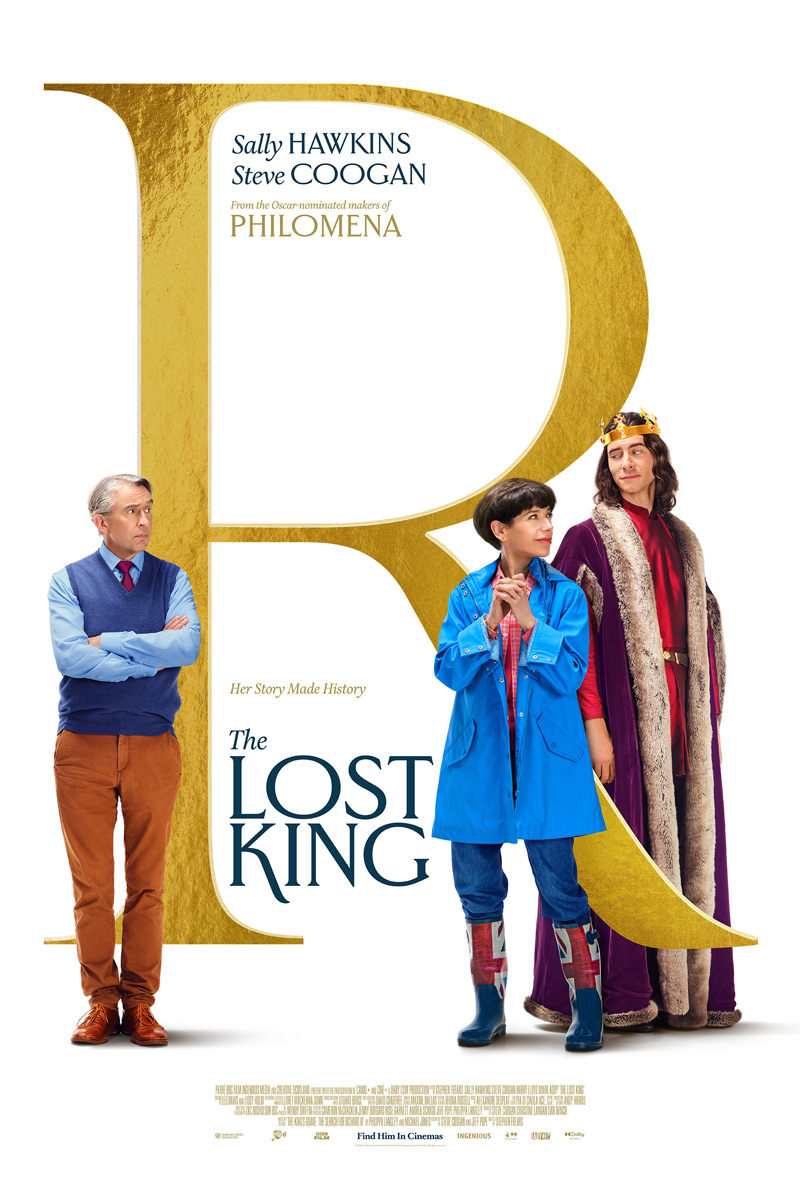
Review by
Eric Hillis
Directed by: Stephen Frears
Starring: Sally Hawkins, Steve Coogan, Harry Lloyd, Mark Addy,
Lee Ingleby, James Fleet

In September 2012 the remains of Richard III were discovered buried
beneath a car park in the English midlands city of Leicester. At the
forefront of the discovery was Philippa Langley, though the level of her
involvement has been the subject of some debate. With Langley portrayed
by Sally Hawkins, Stephen Frears'
The Lost King purports to put Langley front and centre of
the discovery of the King, but in doing so it demonises the other
parties involved.

After a credits sequence that for some unfathomable reason evokes
Hitchcock's
Psycho, we're introduced to Langley as she's passed over for a promotion at
her telesales job. Langley storms into her boss's office, claiming that
she was more deserving of the promotion than those who received it. It's
established early on that Langley is someone whose talents have been
unfairly overlooked, but the film tells us this rather than shows us any
evidence to back up this assertion. We're asked to believe Langley's
claims that she was deserving of the promotion, but we've only just met
her – why should we believe her?
This carries over into the subsequent search for Richard III. I can't
say I know anything about Langley's methods, but I'm sure she put a hell
of a lot of work into researching the king in order to come to the
conclusion that he was residing under a car park. Frears brushes over
this research, creating the impression that Langley was simply following
her gut. Langley becomes interested in Richard after attending a
production of Shakespeare's Richard III and throws herself into the
world of the king, reducing her interest to a whim, as though she
suddenly discovered pilates. The search for Richard is reduced to a
series of hunches, and anyone who objects to acting on feelings over
evidence is villainised.

Langley objects to Shakespeare's portrayal of Richard III, believing he
was a far more benevolent leader than the bard's work would suggest. She
feels it's unfair that history views a real life figure through a
dramatisation, but The Lost King is guilty of the very
same thing. Various real life academic figures are portrayed as cartoon
baddies for not believing in Langley, but the film's presentation of
Langley's research is so flimsy that it's easy to see why this amateur
who just recently became obsessed with Richard III might be dismissed by
academics who have spent their whole adult lives in this field.
Another of the film's themes revolves around Shakespeare's cruel
portrayal of the hunchbacked Richard and how we equate a lack of
physical attractiveness with evil. But again, the film is hypocritical
on this issue as the vision of Richard that Langley is frequently
visited by presents the king as a very conventionally handsome figure.
Having Langley converse with the imaginary king comes off as lazily
convenient writing at best, a condescending portrayal of mental illness
at worst. "I'm not crazy," Langley tells several people. Why are you
talking to a centuries dead king then?

It's a shame that The Lost King is dogged by so many
issues, as its early scenes hint at the potential for what could have
been a highly engaging detective story. Frears does a fine job of
getting us excited early on for Langley's impending quest, but the
journey to find Richard III is glossed over in favour of a trite battle
of the sexes between Langley and various male academics and
intellectuals, all of whom are portrayed as dismissive or patronising
gits. Much like Andrew Dominik's Marilyn Monroe biopic
Blonde, The Lost King seems more interested in making some
cheap points about the patriarchy than in celebrating the achievements
of the woman at the centre of its story.


